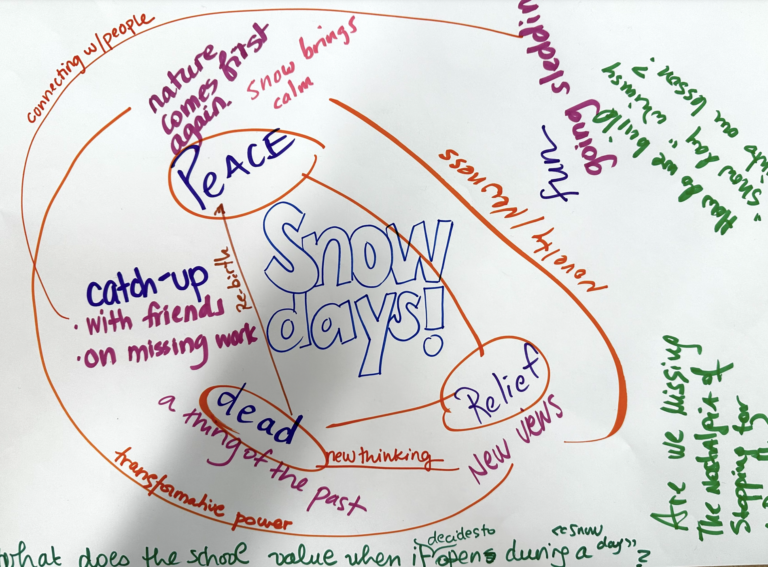Another cultural force that arose was the idea of modeling, which came after the book club session ended. Kristin Gilliland, Middle School Assistant Principal, who participated in the learning group session, was also part of a whole-school subcommittee of the Teaching & Learning Committee (TLC) in charge of designing a workshop for all our teachers (100+) at an upcoming Professional Development day. She suggested using the routine with teachers as a way to unpack their understanding of what “well-being” means to students, while also taking the pulse of the community regarding well-being and gathering data.
The Making Meaning routine had traveled from a book club session to an entire community thanks to a single administrator’s willingness to learn and share her learning.
When I asked Kristin where she got the idea to suggest using the routine for a whole-school PD day, she talked about the cultural forces of time and modeling: “It was perfect timing. We had done it [the routine] as a learning group, and what I really valued during that time was that we had the opportunity to go through the routine together. I also appreciated that Kristen shared some of her learnings as she used it with her students.”
She also mentioned that, like with any other routine, the sub-committee in charge of well-being decided to modify it slightly to meet their goals: “It also gave us the opportunity to modify slightly the end of the thinking routine based on the outcome we were looking for.” This is a reminder that Project Zero routines are versatile and adaptable, and at the end of the day they need to fit the kind of thinking we want to happen.
Finally, resources and supplies are important, too! Kristin emphasized the idea of using color coding for each part of the process: “It was super important to make sure we had supplies that matched what the thinking routine was asking us to do. I know sometimes people [think that] colors don’t matter, but colors do matter to really be able to piece the different parts together.”
The story doesn’t stop there. Right after the workshop, some teachers came up to Kristin to ask about adapting the Making Meaning routine in their own context. Middle school French teacher Gaetan Boinet, for example, found it might be a good fit for his learners and started using it the next week after the workshop. Overall, Kristin noticed that “it was great to see how a teacher took something that they participated in and made it their own.”
Not only have all WIS teachers experienced the routine by now thanks to a single administrator attending a book club session, but Kristin will co-present the journey of this thinking routine with Anne Leflot, Upper School Assistant Principal & Student Life Coordinator, at the upcoming WISSIT (WIS Summer Institute for Teachers), thus having the potential to impact dozens of educators in the area and beyond.
So… next time there is an opportunity in your setting to learn alongside your staff and faculty, please join! Your teachers will be grateful that you showed up, and you will expand the impact in your community exponentially. If such an opportunity does not exist yet in your own setting, it’s time for you to be the change you want to see: no other stakeholders than administrators have more agency in developing their schools into cultures of thinking and hubs for deep learning.
And if you haven’t done so already, sign up for WISSIT, which will happen August 5-9 at WIS’s Primary School campus.
Additional Resources:
